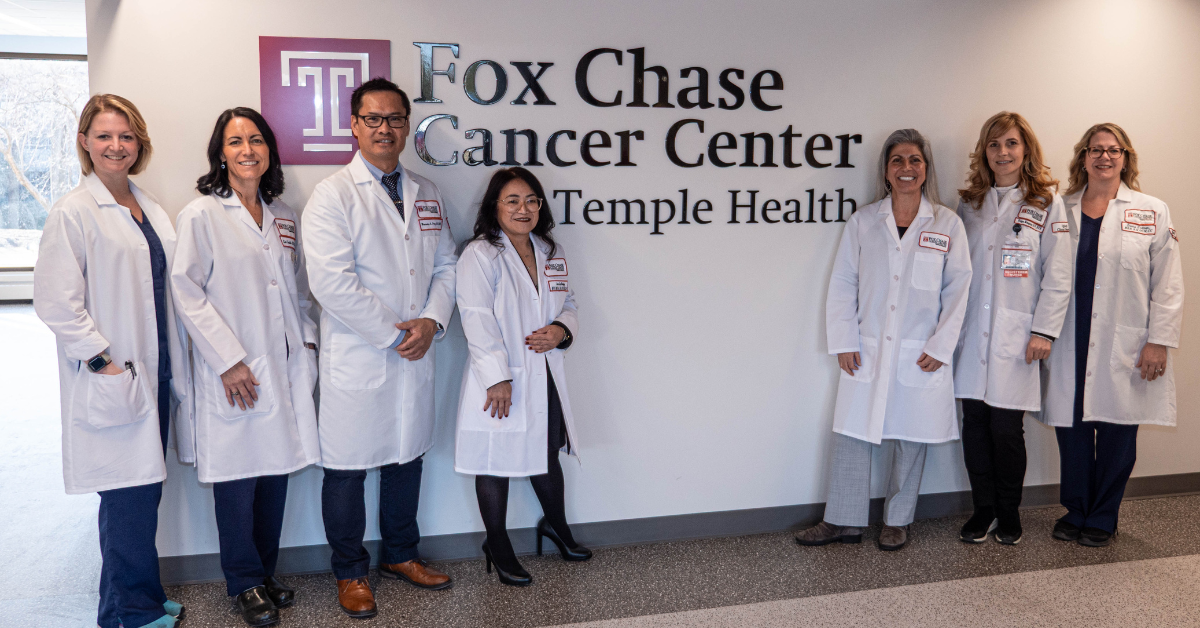
In a keynote address at the Oncology Nurse Advisor Summit, which was held virtually in March, members of the Fox Chase Cancer Center Office of Clinical Research (OCR) highlighted the important roles nurses play in cancer clinical trials.
Oncology nurses are a pivotal part of many key cancer care services, including clinical research. Collaborating closely with scientists and principal investigators, research nurses are integral to ensuring research participant safety, data integrity, study management efficiency, and quality.
“Nurses in research are part of the backbone of medical advancement, blending expertise, compassion, and meticulous care to drive innovation and improve patient outcomes. Their critical roles and meticulous work ensure the integrity and success of our scientific progress,” said Teena Kochukoshy, MD, MS, Associate Vice President of the OCR.
“Between 2024 and 2025, 15 new cancer therapeutics have received approval from the Food and Drug Administration. Additionally, the FDA expanded indications for 15 previously approved treatments to cover other cancer types,” said Anna Liza Rodriguez, MSN, MHA, RN, OCN, NEA-BC, Chief Nursing Officer and Vice President of Nursing and Patient Services at Fox Chase.
“While the American Cancer Society estimates that in 2025 more than two million new cancer cases will be diagnosed in the United States, cancer incidence rates have steadily declined since the 1990s, and survival rates for all cancers combined have increased. Clinical research is foundational to the evolution of clinical and practice paradigms, resulting in improved outcomes and survival.”
The ONA Summit is a yearly conference held by Oncology Nurse Advisor, an online publication of the Haymarket Medical Network that offers clinical updates and evidence-based guidance to the oncology nurse community.
Rodriguez was joined by OCR colleagues: Kimberly Costello, BSN, RN, OCN, CCRC; Denise Erdman, BSN, RN, OCN, CCRC; Halyna Matviyishyn, BSN, RN; Victoria Sabella, BSN, RN; Kristin Virag, MSN, RN, OCN; and Wencesley A. Paez, MD, MS.
The clinical research team highlighted the various roles of oncology nurses in basic, translational, clinical, and population-based research.
“Here at Fox Chase, we enrolled 478 patients to treatment trials last year. We’ve found the easiest way to support clinical research is to have different departments work in parallel. The important thing about the OCR is that we’re collecting the data of all the patients treated on these protocols,” said Sabella. “There are numerous roles within the OCR and many of them fit nurses very well.”
The responsibilities of nurses in research include recruitment of study participants, clinical care, clinical observations and assessments, adverse event monitoring, data collection, participant follow-up, and care coordination. Patient education and advocacy throughout the clinical trial process are key responsibilities. Nurses serve as navigators who help patients find an appropriate clinical trial and guide them through trial enrollment. They ensure that patients understand the risks and benefits of a clinical trial and whether it is appropriate for their care.
A particularly important step in this process is reminding patients that they are in control of their treatment and making sure their options are laid out clearly. The nurses support the patients in making informed decisions about participating in clinical trials.
If a patient chooses to continue with a clinical trial, nurses are by their side. They serve as coordinators to ensure continuity of care among all disciplines involved in the patient’s treatment, making for seamless patient transition across all care settings — inpatient, ambulatory, or community. This includes offering support throughout every stage, from providing transparent information about a diagnosis to connecting patients with valuable services.
Lastly, nurses are there to provide comfort and support patients through the complex challenges that accompany a cancer diagnosis. These challenges can be particularly daunting when patients are faced with a new treatment plan like those encountered in clinical trials. As patients progress through the stages of a trial, nurses provide necessary support, which includes education, advocacy, and companionship.
“Oncology nurses have undeniably played a huge role in changing the clinical trial paradigm,” said Paez. “It is through their dedication and collaboration that we are able to connect patients with the best and latest treatment options. At Fox Chase, we are fortunate to have a team of oncology nurses who participate in every type and phase of clinical research.”